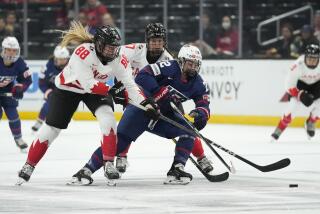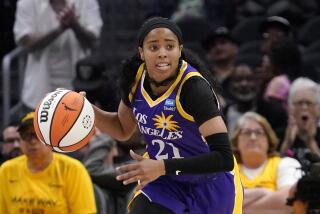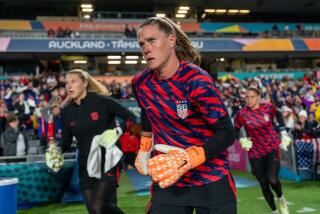Nothing Stops Her
Rod Gunn had insisted that all three of his children play a sport, but he was stunned when his eldest child, Chanda, found her new athletic calling at age 14.
“For the first week I walked around muttering to myself, ‘My daughter is a goaltender,’ ” he said.
“I didn’t try to stop her. At the time, it was somewhat of a blessing. She had always been active and her mother had taken swimming away from her because of the epilepsy.”
Diagnosed with epilepsy at age 9, after she suffered a grand mal seizure while playing a video game with her family, Chanda Gunn of Huntington Beach has faced life the way she faces shooters on the ice: square, with no fear, and with every expectation she will prevail.
Having epilepsy is a fact of her life but not the defining characteristic. Taking medication and having her blood drawn monthly are as normal to her as slipping her hockey jersey over her head, strapping on her pads, breathing in and breathing out.
The seizures “are under control,” said Gunn, now 25. “I’ll have them my whole life, but they’re few and far between. I worry just as much about having a heart attack or stroke.”
Gunn doesn’t consider herself a hero because she plays the most difficult position in a developing sport, or because she was among 20 women nominated to the U.S. Olympic women’s hockey team for the Turin Games last week. “They made a big deal of it,” she said of the ceremony in Bloomington, Minn., “with balloons and everything.”
Maybe it was a big deal. Not that she’s an epileptic or a goalie, but that she’s a young woman whose perseverance and compassion match the considerable athletic skills she tapped when she faced down Team Canada in a shootout last spring and led the U.S. women’s team to its first world championship.
Introduced to hockey when her parents canceled a family camping trip and instead took her, younger sister Amanda and brother Jake to a King game, she was instantly hooked. Jake is now a junior on UCLA’s club team.
“When you’re a little kid, everyone wants to be a goalie. It’s the coolest thing ever,” she said. “My brother was a forward, and he was pretty good. He’d played 2 1/2 years. This was a way I could outdo him when we played in the frontyard.”
Unfettered by many of the superstitions that set most goalies apart, Gunn is cheerful by nature and an eager learner. She was invited to her first U.S. national team camp in August 2002 and has been part of the U.S. program ever since, making her debut at the world championships in 2004 and earning top goaltender honors in anchoring Team USA’s world title last April in Sweden.
“These athletes certainly don’t just stumble to the top,” said Ben Smith, coach of the women’s Olympic team. “This year has been a breakout year for her.”
But in many ways, she hasn’t changed. She does volunteer work at seniors’ homes and has coached aspiring hockey players, spending several summers with the girls who participated in the California Selects program her father runs out of the family-owned skating rink, Skate Zone, in Huntington Beach.
From each activity she takes something unique.
“The 19-year-olds, I help them with their college decisions,” she said of coaching. “The 16-year-olds, I tell them what they have to look forward to. The 14-, 12- and 8-year-olds, you’re the one who teaches them how to skate. I’m their first coach. There are kids playing college hockey now, I tied their skates for them.”
Some may never reach that level but will be touched by her nonetheless. She has written an online journal for the Epilepsy Project, a clearinghouse for information on epilepsy, and she hears from people who are desperate, confused or in need of a sympathetic ear.
Her correspondents range from “goalies to mothers,” she said. “I know one mother whose daughter is 11 and just had brain surgery. People who have had trouble getting their licenses. I get a lot of international e-mail from countries that don’t necessarily have the medications we do.”
She won the NCAA sportsmanship-of-the-year award for 2003-04 while a senior at Northeastern University in Boston, where she’d started an inner-city youth hockey program. She also won the Honda Inspiration Award and the Hockey Humanitarian Award, given to the sport’s top citizen, and was a finalist for the Patty Kazmaier Award as the nation’s top female hockey player.
“When she won the humanitarian award and I sat listening to everything that was being said about her, I was just amazed,” Rod Gunn said. “Even I didn’t know all that about her.”
Few people might have had the chance to know her. She started college at the University of Wisconsin but suffered several epileptic seizures and was in and out of the hospital while doctors tried to regulate her medication.
She withdrew from school late in 1999 after playing seven games and didn’t know where to turn.
“I can’t even begin to tell you how horrible a time that was,” her father said. “Her medication she had taken for years was the same, but she had grown and gotten taller and heavier. And there was the pressure, not only of athletics, but of being away from home and all the new social experiences.
“As a parent, there was tremendous guilt that she had to go through this. But it all worked out. She went to Northeastern, and Boston was a tremendous place for her to go to school.”
She resumed skating three months later and found that Northeastern was willing to take a chance on her. After playing four games as a freshman in 2000-01, she took over the starting job in 2001-02 and earned second-team All-American honors.
In college she got her first custom-made pads, tailored to her 5-foot-7, 138-pound frame. But at the world championships last spring she wore a stock pair anyone could have bought, not that anyone could have used them as well as she did, virtually earning her Olympic berth then.
That she defeated Canada in another shootout Nov. 27 during Team USA’s pre-Olympic tour didn’t hurt her cause. That remains the U.S. women’s lone victory in nine games against Canada, with one game left today at Winnipeg. Canada is the only team that has beaten the U.S. in major international play and they probably will face off in the gold-medal game at Turin.
“We started out and lost four games to Canada. We didn’t lose nicely, we lost fairly dramatically, but I think it made us a better team,” she said. “Everything we’ve done and we’re going to do up until February is designed to make us a better team.”
Rod Gunn and his wife, Penny, planned to watch the U.S. women’s last two warmup games, and he has reservations for his family to go to Turin too. Chanda made 31 saves Friday as the U.S. lost to Canada, 4-2, at St. Paul, Minn.
“It’s all so exciting,” he said. “When she first started playing, I never thought about the Olympics. We were just in shock over the whole situation, that she wanted to play goal.”
Not merely to play, but to excel.
*
(BEGIN TEXT OF INFOBOX)
Top Gunn
Some highlights in the career of goalie Chanda Gunn of Huntington Beach, who turns 26 this month:
* Selected top goalie of the 2005 world championships in which the U.S. defeated Canada for the gold medal.
* Played in the 2004 world championships and posted a 0.86 goals-against average, helping the U.S. win the silver medal.
* As a senior at Northeastern, she won the NCAA sportsmanship award.
*
NBCOlympics.com
More to Read
Go beyond the scoreboard
Get the latest on L.A.'s teams in the daily Sports Report newsletter.
You may occasionally receive promotional content from the Los Angeles Times.







